As the recipient of an Honorary Doctor of Music and Humanities, Nina Simone’s musicianship was impeccable. A child prodigy, she grew up playing piano and organ at church services over which her mother – a Methodist preacher – presided.
Blessed with perfect pitch and a totally distinctive style, she was determined to be the first major black classical artist.
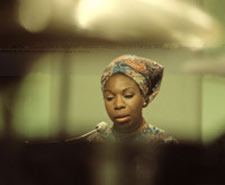 After attending a preparatory year at the prestigious Julliard School of Music, she was forced to abandon that goal when the Curtis Institute of Music in Philadelphia rejected her application for further studies.
After attending a preparatory year at the prestigious Julliard School of Music, she was forced to abandon that goal when the Curtis Institute of Music in Philadelphia rejected her application for further studies.
Convinced the decision was based on race rather than talent, she never forgot the slight.
With classical music no longer an option, Simone concentrated instead on night club work. Her fortunes were forever changed on the very first gig, when – informed she would have to sing or lose the job – she became a vocalist on the spot. Singing had never been a consideration up to that point; yet her voice – smoky, understated yet intense – was every bit the equal of her considerable piano skills.
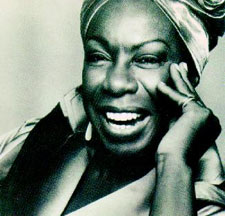 In an attempt to hide her secular identity from her parents, she adopted the stage name Nina Simone (she was born Eunice Waymon). But she didn’t forget her past; gospel and spirituals remained an essential part of the repertoire throughout her career.
In an attempt to hide her secular identity from her parents, she adopted the stage name Nina Simone (she was born Eunice Waymon). But she didn’t forget her past; gospel and spirituals remained an essential part of the repertoire throughout her career.
‘If You Pray Right (Heaven Belongs To You),’ Nearer Blessed Lord,’ ‘Children Go Where I Send You,’ ‘When I See the Blood,’ and ‘Balm in Gilead’ were just a few of the traditional tunes she sang over the years.
Modern gospel-derived material was also well-represented, with ‘He’s Got the Whole World In His Hands,’ ‘Forbidden Fruit,’ ‘I Shall Be Released’ and ‘Take My Hand Precious Lord’ all appearing on record.
She composed her own original gospel material on occasion, and in 1972 released an entire album, The Gospel According to Nina Simone, which mixed traditional songs like ‘Sinnerman’ with originals like ‘Nobody’s Fault But Mine’ and ‘Sunday In Savannah.’
There have been scores of anthologies – well over 100 are currently available – yet due to her catalogue being spread over more than a dozen labels, very few offer career-wide overviews.
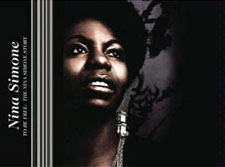 To Be Free: The Nina Simone Story [Sony/Legacy] remedies the situation by licensing pertinent material regardless of where it originally appeared, resulting in the first-ever career-spanning box set for this vital artist.
To Be Free: The Nina Simone Story [Sony/Legacy] remedies the situation by licensing pertinent material regardless of where it originally appeared, resulting in the first-ever career-spanning box set for this vital artist.
As an introduction, you couldn’t do better. Almost four hours long, the three discs sample every segment of her career: from debut recordings made in 1957, to the final studio sessions in 1993 – a decade before her death.
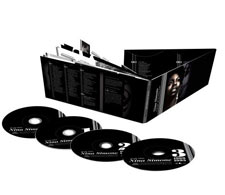 Adding to an already impressive package is a 48 page booklet and a bonus DVD featuring a 1970 Emmy-nominated profile – complete with live footage.
Adding to an already impressive package is a 48 page booklet and a bonus DVD featuring a 1970 Emmy-nominated profile – complete with live footage.
Simone was a master at interpretation. From traditional folk to Gershwin and Ellington, through Bob Dylan and the Beatles (a stirring, gospelized take on George Harrison’s ‘My Sweet Lord’) to the Bee Gees, her eclectic tastes served her well.
With a jazz musician’s sensibility, she could uncover ideas barely implied by others, as on a 1969 soul workout of the Byrds’ ‘Turn! Turn! Turn! (To Everything There Is A Season).’ Her original material was no less compelling.
She addressed racial issues from the stage long before it was deemed appropriate for performers to do so. Her very first attempt, 1964’s stark ‘Mississippi Goddamn’ is seething with a righteous rage, frustration blatantly apparent in the lyric; ‘I’ve even stopped believing in prayer.’
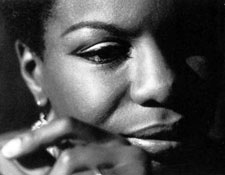 As an artist, Simone considered it her duty to speak the truth. That meant taking on the most sacred of institutions. Even the Beatles. A direct retort to their song of the same name, ‘Revolution (Pts 1 & 2)’ offered a stinging criticism of John Lennon’s idealistic stance: ‘It’s not as simple as talking jive.”
As an artist, Simone considered it her duty to speak the truth. That meant taking on the most sacred of institutions. Even the Beatles. A direct retort to their song of the same name, ‘Revolution (Pts 1 & 2)’ offered a stinging criticism of John Lennon’s idealistic stance: ‘It’s not as simple as talking jive.”
Despite an, at times, contentious personality (explained to a large degree by a later diagnoses of bipolar disorder) she was greatly admired by her peers: the Queen of Soul herself, Aretha Franklin made Simone’s ‘To Be Young, Gifted and Black’ the title track of a 1972 album.
While her uncompromising stance regarding basic human rights exacted a high price, Simone once explained her willingness to make a difference; “I could finally answer Momma’s great unasked question, ‘Why do you sing out in the world when you could be praising God?’”
Simone is featured on the latest Jazz Icons DVD collection. Two shows, from Holland 1965 and London three years later capture her in full flight.
By 1965 she had moved on from the great American songbook, updating her repertoire to include Bob Dylan’s ‘The Ballad of Hollis Brown’ and Oscar Brown Jr.’s ‘Brown Baby,’ along with originals like ‘Four Women,’ ‘Mississippi Goddam’ and – proving she could have a sense of humor even when it came to human rights – ‘Go Limp.’
The London appearance – with her younger brother Sam Waymon singing backup and playing organ – opens with the cautionary ‘Go To Hell,’ which warns to ‘keep your children from wrong doing/’cos you know darn well/that they’ll go to hell.’
‘Backlash Blues,’ a collaboration with the poet and novelist Langston Hughes, offers another word of warning – this time to the powers that be for allowing institutionalized racism.
Proceedings end with ‘Why? (The King of Love Is Dead),’ a poignant tribute to Dr. Martin Luther King Jr. – which Simone’s bassist, Gene Taylor, wrote within hours of King’s assassination earlier that year.
Simone delivers the sorrowful lyric like a sanctified preacher, which, in many ways, is exactly what she was.
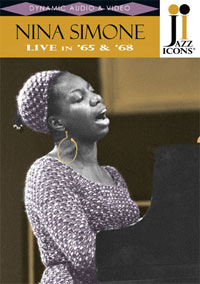 For the aficionado, the Jazz Icons DVD series offers a treasure trove of previously unavailable performances. In every case the transfers – filmed between the late 50s and 1970s – are impeccable, and each disc includes a lengthy booklet with bios and photos.
For the aficionado, the Jazz Icons DVD series offers a treasure trove of previously unavailable performances. In every case the transfers – filmed between the late 50s and 1970s – are impeccable, and each disc includes a lengthy booklet with bios and photos.
![]() The lineup for Jazz Icons Series 3 Box [Reelin’ in The Years/Naxos] is every bit as impressive as the earlier sets.
The lineup for Jazz Icons Series 3 Box [Reelin’ in The Years/Naxos] is every bit as impressive as the earlier sets.
For the most part made up of European concert dates – only Simone’s London show is from outside continental Europe – besides Nina, there’s Cannonball Adderly (Switzerland and Germany both ‘63), pianist Bill Evans (5 shows; ‘64-’75), big band legend Lionel Hampton (Belgium ’58), Oscar Peterson (3 shows ’63, ’64, ’65 – including an early take on his signature ‘Hymn To Freedom’), multi-reed player Rahsaan Roland Kirk (3 shows, two from ’63, plus ’67), and tenor sax master Sonny Rollins (’65 & ’68).
All titles are sold separately, but a bonus disc – exclusive to the box set – features even more from Rollins and Kirk, as well as a third Simone performance, this time from Sweden in 1965.
© John Cody 2009